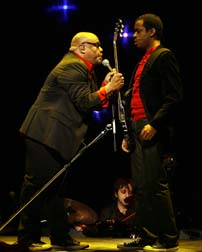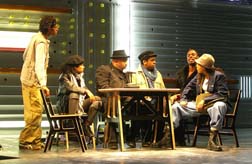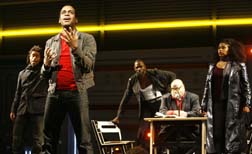By Lucy Komisar
Inter Press Service (IPS), July 31, 2008
Edwina, played by de’Adre Aziza, an attractive young lady in the church choir, has her eye on the Youth (Daniel Breaker). She informs him, And after we marry and you’ve got a job in the corporate sector, you’ll buy me a sprawling two-story house fulla African sculptures from tribes we know nothing about, kente cloth couch covers, and Malcolm X commemorative plates lining the walls of our airy, peach-coloured breakfast nook?
She tells him, You’ll need to blacken up a bit…Put a little soul in your stroll.
Who says leftists don’t have a sense of humour? Welcome to Passing Strange, a witty, inventive satire on Broadway about growing up, rebellious, bourgeois and black in Los Angeles and leaving before 20 to explore the radical corners of Europe. It’s the fictionalised autobiography of eclectic pop, rock, rap, and jazz musician Stew, who wrote the book and lyrics. He co-wrote the music with Heidi Rodewald.
The vignettes are held together by Stew as Narrator and  progress through a set shared by a few chairs, a table, the musicians, and a complex changing backdrop of rods of coloured lights. Director and co-creator Annie Dorsen helps turn the space in your imagination into everything from a hillside where some kids, initiated by the choir leader, are smoking pot, to the communes of Dutch and German anarcho-artists.
progress through a set shared by a few chairs, a table, the musicians, and a complex changing backdrop of rods of coloured lights. Director and co-creator Annie Dorsen helps turn the space in your imagination into everything from a hillside where some kids, initiated by the choir leader, are smoking pot, to the communes of Dutch and German anarcho-artists.
Stew is insightful and sympathetically biting about his encounters on all sides, and his voyage of discovery, a clever personal and political critique, is quite a trip for the audience.
The Youth makes fun of his mother (Eisa Davis), and her two-story, 1976 South Central LA black middle-class dream. Moving in and out of ethnic dialect when it suits, she importunes him to go to church: I know you’d be happier in one of them white churches. Praising the lord in jeans and a t-shirt…Now look, Swami: the tiny inconvenience of a tie and a nice jacket is a small price tuh pay fo’ eternal life!
Narrator Stew declares, Note the return of the Negro dialect… It turns out that church is a Baptist Fashion Show with silk ties, shiny purses, fancy hats, and jewels. The young man declares, This place is as phony as it gets.
He discovers rock music and decamps for Europe, where Naked girls at breakfast tables talk Hegel and Camus. And men dressed up in Gauloise smoke quote Marx right back at you. Where does he get those ideas? From the movies of course; he is enticed to Europe by Fellini, Truffaut, Pasolini, and Godard. It’s the era of socio-cultural-political leftism, and he makes an easy landing.
First stop is Amsterdam: the Youth ends up at The Headquarters Café, where the menu features hashish and radical personal and artistic politics. The café waitress declares, I’m Renata (Rebecca Naomi Jones). I make abstract drawings because representational art is just an ego stroke, you know?
 Christoph (Chad Goodridge) introduces himself: I’m a philosophy professor and part time sex worker. You could say, I hook, therefore I…
Christoph (Chad Goodridge) introduces himself: I’m a philosophy professor and part time sex worker. You could say, I hook, therefore I…
The next: My name is Joop (Colman Domingo) and I believe everyone should be naked all the time. Clothes are chains from which we must break free! I’m naked therefore I…
And, I’m Marianna (de’Adre Aziza). And I’m into tantric meditation, organic psychedelics and white magic. As Joop comments, Makes Berkeley look like the Bible Belt!
But Stew is just as cutting on himself: I dun’ broke my chains and escaped to the North! King James Baldwin! Queen Josephine Baker! They owned Paris and Amsterdam’s gonna be mine! Hallelujah, now I’m standin’ on the Promised Land!
When he decides it’s time to move on, he chooses a city that is closest in politics and spirit, Berlin. Here the song is May Day, conjuring up May 1968 when protests engulfed Europe, the U.S. and elsewhere. May Day, May Day, there’s a riot going down/ In a deep, dark corner of West Berlin town.
The Youth ends up at Nowhaus, which is like the Amsterdam commune, except political instead of artistic.
The Nowhaus manifesto is that, What’s inside of each and every one of us here in this room, what we mistakenly call our thoughts, our feelings and our dreams, have actually been put there by a system, therefore…Our minds have been invaded, conquered and occupied. Hence, as Mr. Venus (Colman Domingo), a performance artist, declares, What’s inside is just a lie… [Isn’t this the theme of the new American movie, Wall-E?]
The Nowhausers want to create an anti-bourgeois community, turning their lives into works of art that stand in opposition to capitalist society. This inspires the Youth to write a song called Revolution. But he gets too caught up in the Gestalt when he declares to Desi (Rebecca Naomi Jones), You cannot accuse third world men of being sexist when sexism itself is a Western concept! We can’t force our values on them! You can’t ignore the cultural specifics.
She reminds him that Nazism was culturally specific to Germany. Should we have ignored it? The Youth replies, I walked right into that one, didn’t I?
He walked into a lot on his European trip and absorbed it like a banquet. But he also gave as good as he got when his comrades told him his guest period was over: Nowhaus is a family of art revolutionaries…Your songs do not critique the hegemony of populist consumption. 
Why should they let him stay? In a joke turned on himself, Stew/the Youth declares, Because I’m black?
He embellishes, Yeah, Mr. May 68: do you know what it’s like to be the object of oppression living under police occupation in the ghetto?
In counterpoint, the Narrator summons up his mother saying, Your friend Terry stopped by again in that brand new Datsun 240Z. He’s making good money. And he’s not even in a gang! The ploy works. The German radicals understand, So blackness is the main subject of your work? And, His ghetto angst is far superior to ours. Then, We love you…like an anthropologist loves a tribe.
The Youth remarks, Tribes must love the attention. I bet it makes them feel like stars!
The best and funniest song in the show is The Black One, which begins:
Who lends the club that speakeasy air? The black one, the black one! Who dances like a god and has ‘wunderbar’ hair? Der Schwarze! Now he’s the life of every soiree! He’ll give the bum’s rush to your ennui. Turn up these lights cuz I barely can see The black one. Is he the post-modern lawn jockey sculpture?
Desi interjects, But remember the story you told me about your grandma, the one who had to pass [for white] in order to get a job? Well, I think you are passing for ghetto.
 Stew remarks, You know it’s weird when you wake up that morning and realise that your entire adult life was based on the decision of a teenager. A stoned teenager. I know there must be some investment bankers out there that know the feeling.
Stew remarks, You know it’s weird when you wake up that morning and realise that your entire adult life was based on the decision of a teenager. A stoned teenager. I know there must be some investment bankers out there that know the feeling.
That Stew could be so honest is a testament to his character. That he could be so witty is a testament to his artistry. And, by the way, for all his satire of the counter-culture, this play marks Stew as very far from bourgeois.

